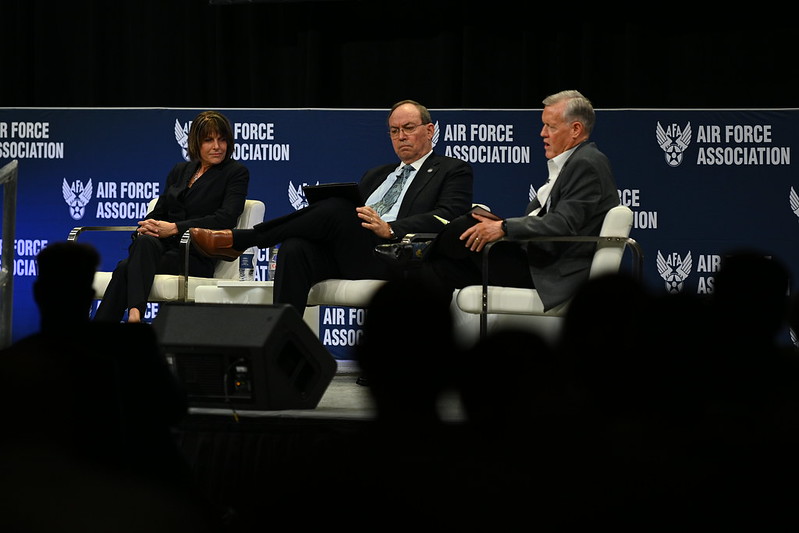Russian President Vladimir Putin’s invasion of Ukraine has united NATO and proven a robust U.S. air and space capability that does not require a no-fly zone, but invasion could have been deterred if the U.S. had stronger air power, said experts at an AFA Warfare Symposium panel on the European theater.
“Our Airmen and Guardians surround the Putin regime,” said AFA president and retired Lt. Gen. Bruce “Orville” Wright, noting that the Air Force presence extends from the eastern flank of NATO to the far east of Russia in the Indo-Pacific region.
“We have everything we need in the context of watching everything that the Russian military, the Putin regime military is doing today,” said Wright. “He, again, is surrounded, certainly vertically, in a three-dimensional way in the integration of our space and air capabilities.”
Dean of the Mitchell Institute for Aerospace Studies retired Lt. Gen. David A. Deptula highlighted that sanctions did not deter the Russian military invasion of Ukraine.
“We’ve lost that conventional deterrent capability,” he said, citing a smaller Air Force than in past decades.
“Sanctions won’t affect current military conditions,” Deptula added. “It’s only U.S. military strength that would have deterred Putin’s aggression.”
Nonetheless, Deptula pointed out that sharing of U.S. Air Force ISR with the Ukrainian Air Force once the conflict began has allowed Ukraine to withstand a 4-to-1 disadvantage in air power with Russia.
“That information sharing gave them the momentum early on,” he said. “And to a significant degree, allows them to deny the Russians air superiority, along with the Russians own demonstrated military incompetence.”
In part, Ukraine is using the ISR data to target a miles-long unprotected resupply convoy, firing from an unmanned Turkish TB2 medium-altitude, long-endurence drone. To date, Ukraine has reportedly destroyed some 50 aircraft and 30 helicopters plus a number of drones.
Of Putin’s failure to take control, Deptula remarked: “He’s completely violated the principal tenet of modern warfare being that the first priority has to be securing and maintaining control of the air.”
Retired Maj. Gen. Kimberly A. Crider, who formerly served as Space Force chief technology and innovation officer, said space is already integrated in NATO’s defense and Russia deterrence.
“Vandenberg Space Force Base, [Calif.] has NATO liaison and exchange officers there on the floor of the Combined Space Operations Center working side by side, day to day, every day, coordinating on the needs of those theater operations in support of those combatant operations,” Crider said.
The multinational Combined Space Operations Center (CSpOC) at Vandenberg also interacts regularly with the emerging NATO Space Center at Ramstein Air Base, Germany.
“We know that this is an important capability for sharing information among allied partners, for coordinating support to NATO operations, and we have a very active engagement,” she said.
Moderator and British Air and Space Attaché RAF Air Commodore J.J. Attridge summed up the Russian mindset, which he said has historically been rooted in self-interest.
“Putin’s self-interest has brought the coalition together and NATO [is now] … stronger than before, and it’s unified the world,” he said. “So, thank you, Mr. Putin for that.”
